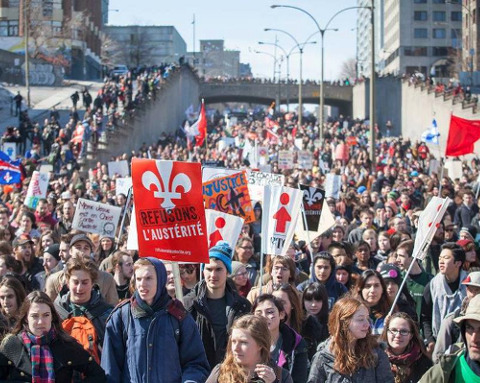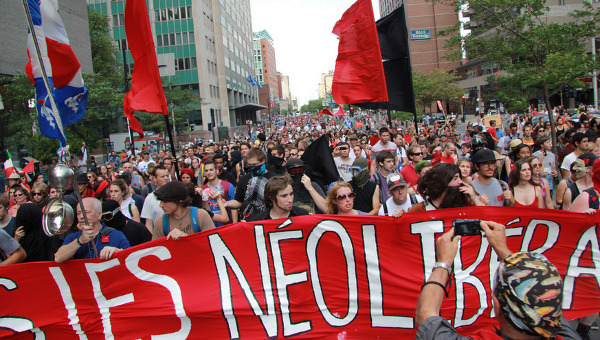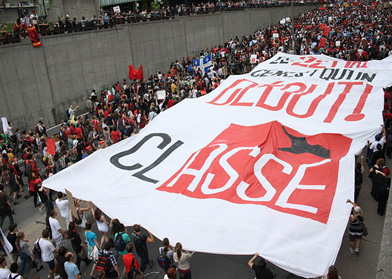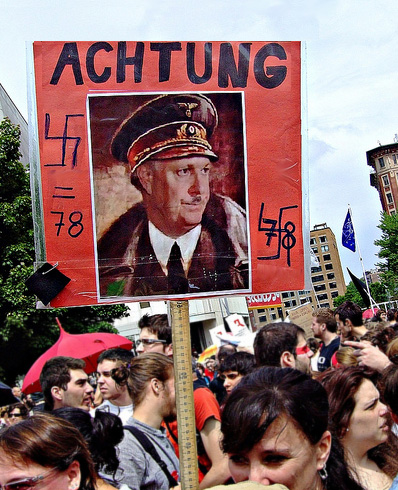Two Views from Quebec on the Canadian Federal Election
The recent Canadian federal election results have taken most commentators and social activists by surprise. If the anti-Harper sentiment amongst two-thirds of the population had been clear enough for more than a year, very few had on their radar a Liberal majority outcome (even given the notoriety of the electoral distortions of the single-member plurality electoral system in Canada). The collapse of the social democratic NDP back to traditional base support levels in terms of the popular vote was equally unexpected.
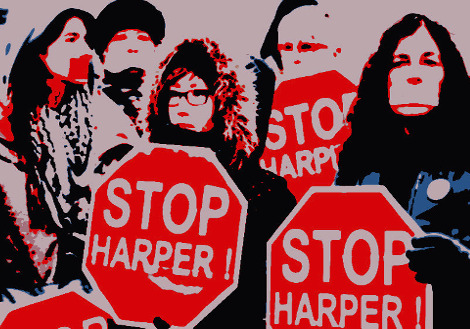 Not surprisingly, post-election commentary has focused on how much the Liberals will depart from the core neoliberal framework of the Conservative government, although a huge number of small and symbolic gestures will be a breath of fresh air even if their meaning is not so certain. The ambiguities of Liberal governance are already manifest: Canadian bombing runs in Syria are to end while troop commitments on the ground are to be maintained and possibly increased; a highly public letter from PM-elect Justin Trudeau insisted on new relations with government workers, even while a small army of privatizers and consultants begins to huddle in Ottawa (having gained ample credentials under the Ontario Liberal governments at Queen’s Park); and Parliament will apparently be hurried back to pass a tax cut and a modest increase in the intake of Syrian refugees.
Not surprisingly, post-election commentary has focused on how much the Liberals will depart from the core neoliberal framework of the Conservative government, although a huge number of small and symbolic gestures will be a breath of fresh air even if their meaning is not so certain. The ambiguities of Liberal governance are already manifest: Canadian bombing runs in Syria are to end while troop commitments on the ground are to be maintained and possibly increased; a highly public letter from PM-elect Justin Trudeau insisted on new relations with government workers, even while a small army of privatizers and consultants begins to huddle in Ottawa (having gained ample credentials under the Ontario Liberal governments at Queen’s Park); and Parliament will apparently be hurried back to pass a tax cut and a modest increase in the intake of Syrian refugees.
The post-mortems on the NDP collapse have been many, ranging from indignation at the party’s incompetent electoral strategy to the predictable critique of the never-ending NDP drift to the centre, which shook loose their electoral base and gave space to the Liberals to out-flank them on the left with a few high-profile policy gestures (even while the Liberals polish their credentials as the other party of the Canadian capitalist classes). The political strategy of running on the mantle of fiscal conservatism has now claimed three spectacular losses in a row in Ontario alone (the Olivia Chow mayoralty run in Toronto, the Andrea Horwath loss to the provincial Liberals, and now the federal election with its wipe-out of the NDP in Toronto). The recent BC and Nova Scotia defeats could be added to the discussion.
But the strategic orientation of the NDP to the political centre has been long in the making. More than one wag has traced this back to the 1956 Winnipeg Declaration and the formation of the ‘New Party’ in 1961. But the important breaks began under the leadership of Ed Broadbent and the tactics and strategies of a ‘new realism’ in response to free trade and the flood of neoliberal initiatives that began to emerge from the 1980s on. Although with few of the major political divisions that accommodate a new ‘third way’ politics in other social democratic parties, or the adoption of Blairite bluster, these politics established their hold on the party in its organization, platform and electoral strategy. The focus of the party apparatchiks, and most of the parliamentarist factions, was on
dislodging the Liberals and becoming the northern version of the U.S. Democratic Party in occupying the centre as the left alternate party of government.
The leadership of Jack Layton gave the appearance, at times, of pushing the NDP toward a more progressive stance with the focus on the ‘social economy’ and ‘greening jobs’, but this really ended up being a ‘third way from below’ as the electoral strategy moved even more decisively toward the political centre, mobilizations with social movements all but abandoned.
With the radical left in Canada at its lowest organizational levels in decades and in complete disarray, apart from some of the capacities forming around Québec Solidaire, it is hard to avoid the conclusion that working class and progressive politics in Canada are at a major impasse with no clear direction in sight. There is the obvious imperative to build socialist organizational and political capacities, but few on the radical left in Canada are taking this seriously and moving beyond gestures without political commitment or resources.
The new Liberal government’s specific promises of departure from the Harper regime will allow space for some campaigns to intensify their efforts, such as around the Canada Post cutbacks and childcare, while other Liberal government policies, such as around pipeline
developments, open-ended support for Israel, and the Trans Pacific Partnership, will compel new mobilizations. If only for organizational needs, the NDP will go through some measure of internal evaluation to assess the degree of the election disaster. But it is completely illusory to expect anything other than a re-affirmation of the cautious social democracy to which the NDP has always adhered. The question is whether the anti-neoliberal and anti-austerity movements that have been forming new political organizations of the Left in other parts of the world will begin to find some echo in new campaigns and political breakthroughs in Canada.
The discussions of the election amongst the Left in English Canada have had few contributions to the debate from Quebec. Here The Bullet publishes in translation (by Richard Fidler) two contributions from leading activists in Quebec on the election, the end of the Harper government and the challenges for the left.
— Socialist Project
Collapse of the Orange Wave:
The NDP Was Sunk by its Turn to Austerity, Not the Niqab
Roger Rashi
If 2011 was the year of the Orange wave, 2015 will go down in history as the year of the Orange rout. Ahead in the opinion polls in late August, the NDP found itself in a field of ruins by October 20. Its hopes of forming the next government of Canada dashed, the social-democratic formation led by Thomas Mulcair is now the third party in Ottawa, having lost its official opposition status, with 44 MPs and less than 20 per cent of the votes.
 Party strategists will be strongly tempted to attribute the crushing defeat to the niqab debate. But if the Islamophobic card played by a desperate Stephen Harper near the campaign’s end – seconded by Gilles Duceppe in a bad remake of the PQ’s equally xenophobic Charter of Values – had such an effect, it was because the NDP’s descent into Hell was already under way.
Party strategists will be strongly tempted to attribute the crushing defeat to the niqab debate. But if the Islamophobic card played by a desperate Stephen Harper near the campaign’s end – seconded by Gilles Duceppe in a bad remake of the PQ’s equally xenophobic Charter of Values – had such an effect, it was because the NDP’s descent into Hell was already under way.
When a triumphalist Mulcair, at the end of August, mounted the tired old horse of austerity by promising balanced budgets, the fix was in. The Liberals led by Justin Trudeau, who were just awaiting the opportunity, outflanked the social democrats on their left by committing themselves to massive investments in infrastructures even if it meant running up budget deficits for three years.
In the following weeks, while the Liberals hammered home the nail by declaring themselves the “real progressives,” the NDP saw its
support melt like the spring snows until the inevitable outcome on election night. The niqab trickery simply increased the downward trend, as the NDP was already in freefall.
A Foreseeable Defeat
The NDP’s rout resulted from much more than a strategic blunder, although that in itself was a major factor. It reveals once again the profound political bankruptcy of Western social democracy. Since the end of the 1980s social democratic parties have been mired in the ‘third way’ so dear to Tony Blair. The NDP, a pale version of its European big brothers, was an enthusiastic disciple and the neoliberal turn was begun in Ontario by the government of Bob Rae. The result was a disaster, and almost 20 years later the NDP has still not recovered in Canada’s most populous province.
The financial crisis of 2008 saw the international social democracy turn even further to the right, adopting harsh austerity politics everywhere in the global North. The NDP followed suit and its provincial branches in British Columbia, Nova Scotia and Ontario were outflanked in the last three years by their Liberal rivals – with the notable exception this spring of Alberta, where a very moderate Keynesian program allowed Rachel Notley to beat the local arch-Conservatives.
While the federal NDP benefited from the Alberta party’s victory, and its support grew during the summer, the upturn proved ephemeral. The NDP is now back to where it stood before the Orange wave of 2011.
In Quebec, a House of Cards
His troops in a state of shock as the disastrous results were posted on TV screens, Mulcair tried to console them in his election-night speech by citing the NDP’s encouraging performance – in his view, at least – in Quebec. The reality is quite different, however.
The NDP was unable to consolidate its Quebec breakthrough of 2011. Not only has it suffered a major loss in the size of its Quebec caucus, which is down from 59 in 2011 to 16 today, but its electoral support in Quebec proved extremely volatile. From a peak of close to 50 per cent in the late August polls, it was down to 25 per cent on election night. In simple terms, the anti-Conservative vote in Quebec, which had been placed temporarily with the NDP, ended by finding a niche elsewhere.
There is a very simple reason for this fragility. Under Mulcair, the party had no desire to connect with the Quebec social movements. With the notable exception of Alexandre Boulerice, the NDP stood aloof from the anti-austerity mobilizations in Quebec, both in 2012 [the “Maple
Spring”] and in 2014-15. It hurt the environmental movement through its support for the Energy East pipeline project, and came under fire from the Palestine solidarity movement when it censured MPs or candidates who dared to criticize Stephen Harper’s unshakeable support for the Israeli Right. And it is worth noting that not one trade union or social organization in Quebec openly supported this party in 2015. As to the national question, Mulcair’s reputation as a scourge of Quebec nationalism, which he had forged in his years as a provincial MNA and Liberal minister, prevented him from raising this matter with even minimal credibility.
Is There a Jeremy Corbyn in the NDP?
The balance sheet on the election will be painful for the NDP. Mulcair, a defector from the Quebec Liberal party who did not hide his sympathies for Thatcher when he was a provincial MNA, is unlikely to survive for long after this defeat. Elected by a close margin on the fourth round at the party’s 2012 convention, with only 57 per cent of the
votes, he had undertaken to consolidate the party in Quebec and to win new support across Canada by moving the NDP closer to the centre. He has failed completely.
Is it possible to anticipate a sharp turn in this party, with the emergence of a left leadership candidate who is authentically anti-austerity, like Jeremy Corbyn in the British Labour party? Let’s just say this is not part of the NDP tradition. The left currents that did appear, either in the 1970s with the Waffle or in the early 2000s with the New Politics Initiative, disappeared with little consequence. The time has come for the anti-austerity left to put the final bracket on the NDP parenthesis. •
This article first published by Presse-toi à gauche.
Poor Player, Poor Loser
Pierre Beaudet
The result of the October 19 vote was as cruel for the NDP as the repeated polls of the previous few weeks. Tom Mulcair’s incompetent spin doctors dishonestly attribute it to the ‘niqab effect’. That’s a big lie, as the decline had begun long before. In fact, neither the doubtful spin doctors nor Mulcair himself, still less his rather apologetic herd of followers, are capable of calling it like it is, or of stifling the cant even when they know they are talking nonsense.
 This is not new. Since Mulcair became leader everything has been destroyed in this party, starting with political intelligence and the right to think. In reality, Mulcair campaigned as he has conducted his professional and political life all along, essentially on the right – from his role as counsel for Alliance Quebec, rolling back Law 101, to his role as a minister and pit-bull MNA on behalf of Jean Charest. But even then Mulcair has a particular personality: he is a shark prepared to eat anything, with the supreme conviction that he is always right.
This is not new. Since Mulcair became leader everything has been destroyed in this party, starting with political intelligence and the right to think. In reality, Mulcair campaigned as he has conducted his professional and political life all along, essentially on the right – from his role as counsel for Alliance Quebec, rolling back Law 101, to his role as a minister and pit-bull MNA on behalf of Jean Charest. But even then Mulcair has a particular personality: he is a shark prepared to eat anything, with the supreme conviction that he is always right.
The Taming of a Party
However, it would be cheap psychology to blame everything on Mulcair. The main criticism one can make of the NDP is that it agreed to play his game. It was clear that Mulcair wanted to transform the party into his own machine. MPs and candidates who wanted to speak out (there were not
many) were called to order, such as Nycole Turmel, Linda McQuaig, Libby Davies and a few others. Meanwhile, Mulcair expected the rest to peacefully go about their business as ‘yes men’ and ‘yes women’, mere cheerleaders. To be sure, most NDP MPs supported their
constituents in their problems with the government administration, somewhat like social workers of a special kind. Occasionally, bold ones like Alexandre Boulerice or Yvon Godin were allowed to sound off against Harper’s atrocities. But overall, this party of social-democratic origin, weakened by years of stagnation and equivocation, was unable to define its identity, build a solid base and propose an alternative.
A Damning Record
This balance sheet is particularly evident on some key issues. On the Quebec national question, the NDP has failed to adopt a strategic line, notwithstanding some feeble and episodic attempts. This was most obvious in Mulcair’s doubletalk. In Canada, he presented himself as the champion in the fight against “separatism,” the man who, as he said during the election campaign, had crushed the Bloc Québécois behind the federal state in both referendums – without mentioning, of course, that the 1995 “victory” had been a huge fraud. But in Quebec, Mulcair promoted the “Sherbrooke Declaration” which said, in the end, that a vote of 50 per cent + 1 would constitute the “clear majority” demanded by the Supreme Court of Canada. Some naive people could wax enthusiastic, but in reality the straightforward question remained on the table: Do the Quebec people have the right to self-determination, yes or no? There are not 57 ways to say that, it is not a question of arithmetic. Now we learn that the “Orange wave” of 2011 in no way altered the NDP’s credibility deficit in Quebec, it was simply the result of happenstance.
A Social Democracy that is less and less ‘Social’
and less and less ‘Democratic’
The second pitfall: The NDP failed to propose a program even worthy of the social-democratic ambitions of its founders. In the early 1970s that perspective was closed off by David Lewis, when the party leadership fought the coalition of trade unionists and intellectuals known as the Waffle. Subsequently, with some variance here and there, the NDP slid toward “good governance,” particularly in the provincial governments it headed in British Columbia, Manitoba and Ontario; in the latter Bob Rae, like Mulcair a Liberal disguised as NDP, ruined the party. More recently, the turn was sharper. As in England with the Labour party or in France with the Socialist party, the social democracy has become “social liberal.” The “new” NDP could strut about as a “good administrator” according to the criteria of the big banks and hope to court the centrist vote traditionally captured by the Liberals. But almost everywhere this evolution led the NDP to severe defeats. In the October 19 election campaign the NDP, overtaken on its left by the Liberal party (it was there for the asking!), lost a large part of its attraction, with the result we now know.
What party, for what interests?
Finally, the NDP failed to connect with the popular movements. Although the party’s constitution gives some weight to the unions, the NDP remained fairly distant from the workers’ demands to which it sometimes gave lip service. Nowadays the popular movements find that the NDP is at best a “non-enemy,” rarely an ally, and never a partner. Under Mulcair, this gap has increased. The leader never went to the trouble to consult the many movements defending human rights. He had a completely episodic relationship with the First Nations. We never saw him in Quebec during the big popular demonstrations, for example, of the Carrés Rouges in the spring of 2012. Did he say a single word in support of the students’ demands? That would probably have put him at odds with his friends in the Quebec Liberal party.
A totally wrong calculation
For Mulcair, this is normal. The popular movement is not his world, it is not his environment, he does not believe in it. But for the NDP, the consequences of this attitude are of the utmost gravity. Without close links to the popular movement, the party is condemned to marginality. In Quebec, in any case, the popular layers simply said to themselves, if we’re going to cast a “strategic” vote against Harper, we may as well vote for the one who has a chance of winning. From a completely superficial “orange wave” we went to a “red wave” that was equally superficial. In the end, we are left with a party in decline, without a soul, with very few members in Quebec, and without a perspective. As for Mulcair, it seems he will continue as before. It is ‘his’ party. He is effective in Parliament at raising hell and intimidating his adversaries, which gives the totally false impression that this venerable place is important in the political process (it is not). A few headlines, and then we go on to other things. Some call that “democracy.”
While waiting to become an ambassador…
I was not surprised to see Mulcair cling to his position after the debacle of October 19. He is a professional politician, I don’t think he knows how to do anything else in his life. He might, as his predecessors have done, agree to be appointed ambassador, or why not “governor general,” to boast about the “best country in the world” (Mulcair really thinks that). But Trudeau has so many friends whose debts and promises he must repay, so Tom may have to wait a while. Meanwhile, he will remain in his comfortable and well paid position. Unless a Canadian Jeremy Corbyn emerges, like a rabbit out of a hat. But as a rule the magicians are going to tell you that the rabbit does not exist.
As a final note, there is a positive “collateral effect” to the NDP’s downfall in Quebec. For some months Mulcair and the handful of persons who are involved in the Quebec NDP were concocting the launch of a provincial NDP. These clowns thought the “orange wave” would sweep all before it, and – as Mulcair hoped – eradicate the Quebec sovereigntist movement, on both the right (the PQ) and the left (Québec Solidaire). But now, at least in the short term, they will have no time to come and hassle us further.
Also, I hear some friends in Canada say they are going to campaign to get rid of Mulcair. I wish them the best of luck. Mulcair at least knows how to do something: to intimidate and threaten. He will be a formidable enemy for those who want to reform the NDP. •
Pierre Beaudet teaches international development at the University of Ottawa and is a leading member of the Political Action Collective of Nouveaux cahiers du socialisme in Quebec. His article, slightly amended here, was first published at Presse-toi à gauche.


